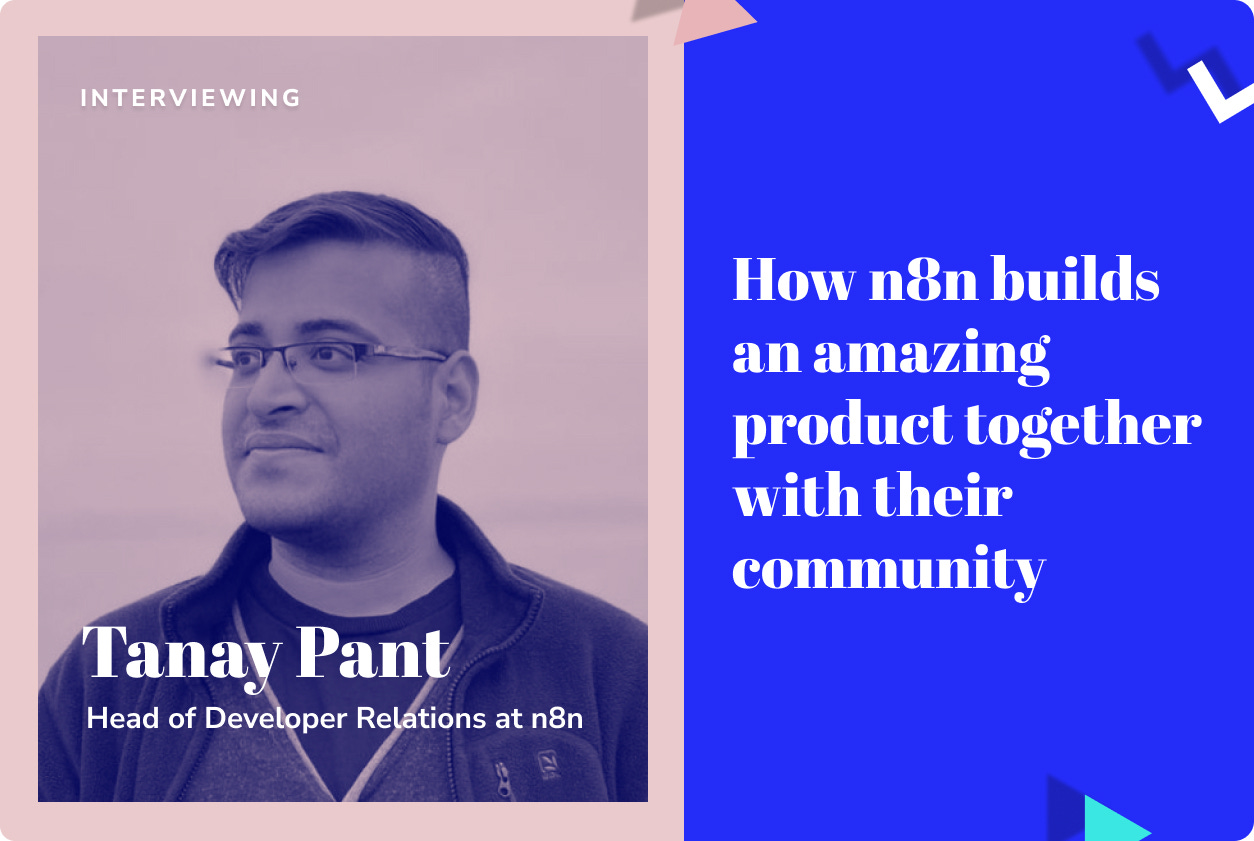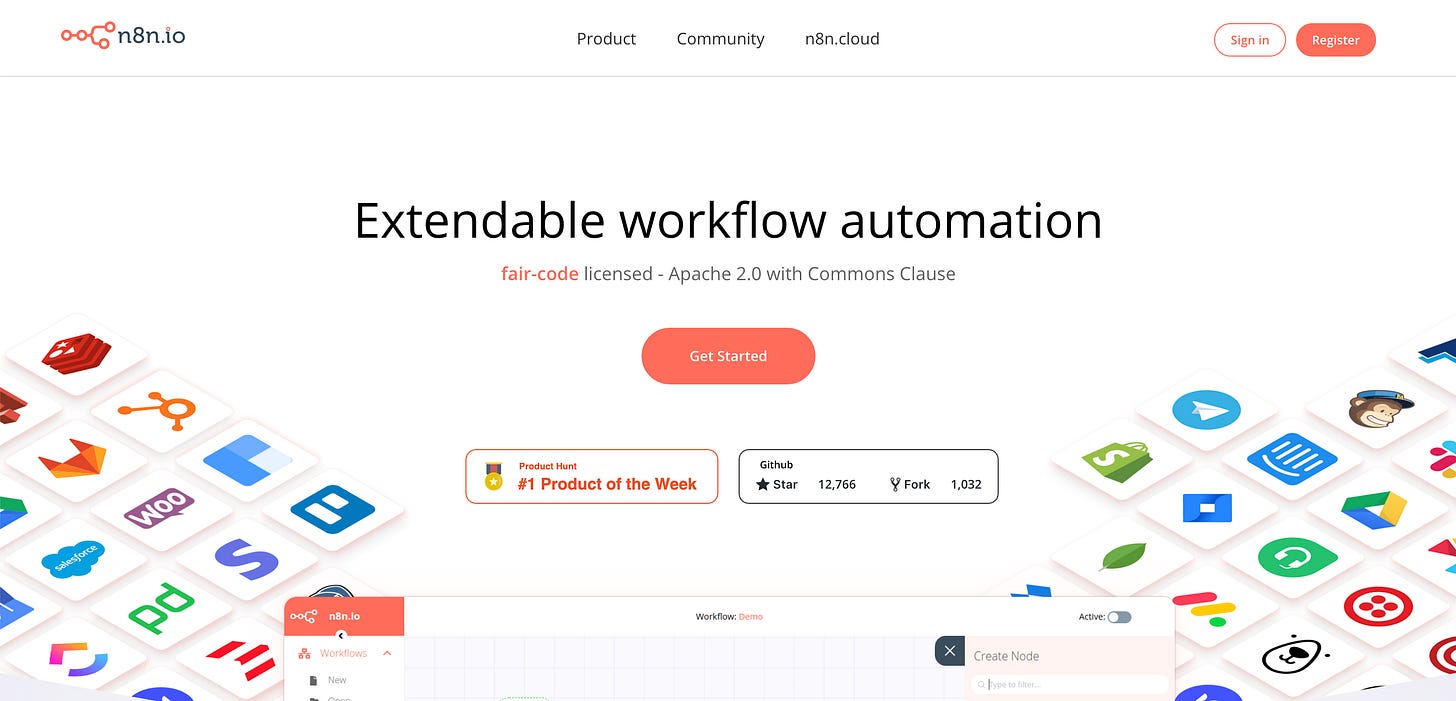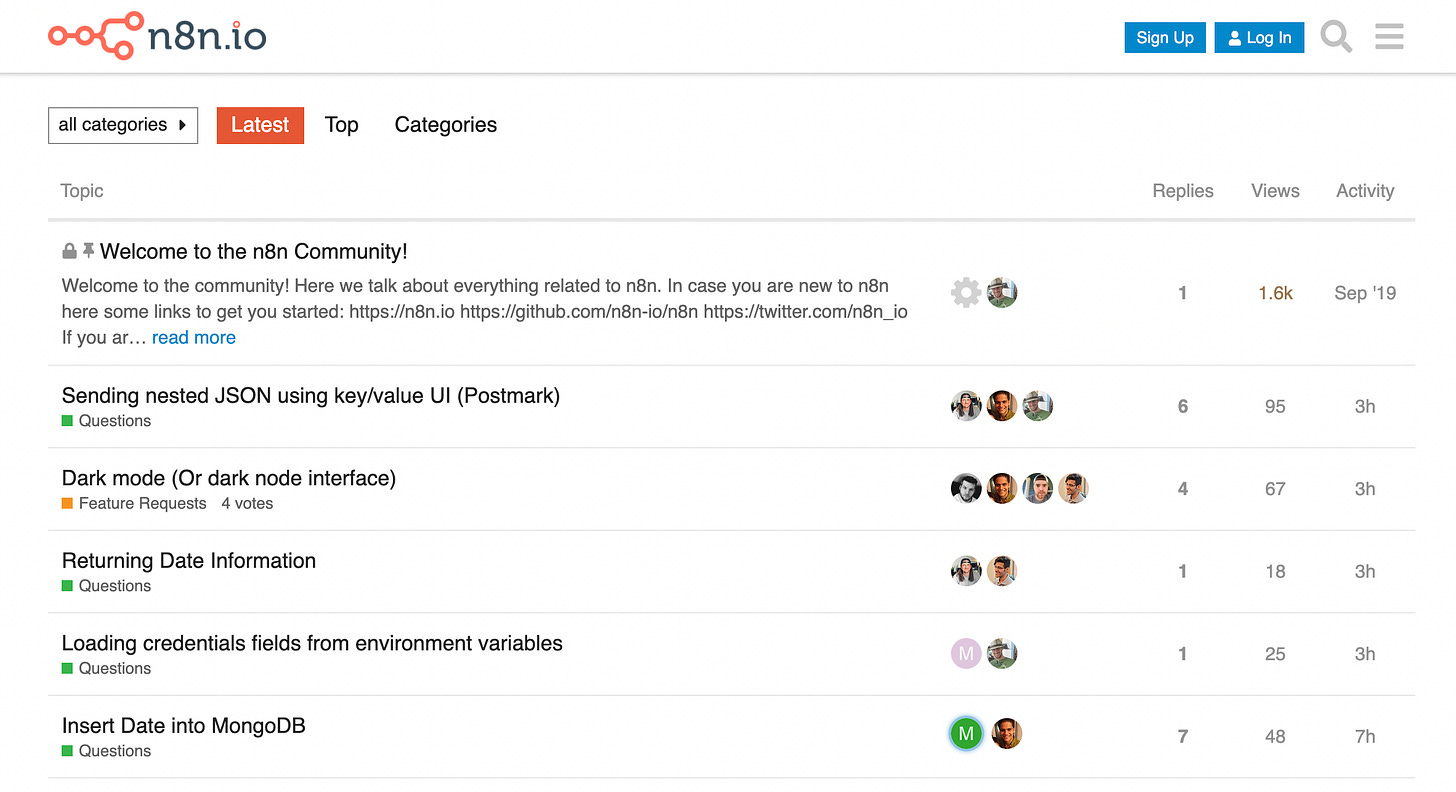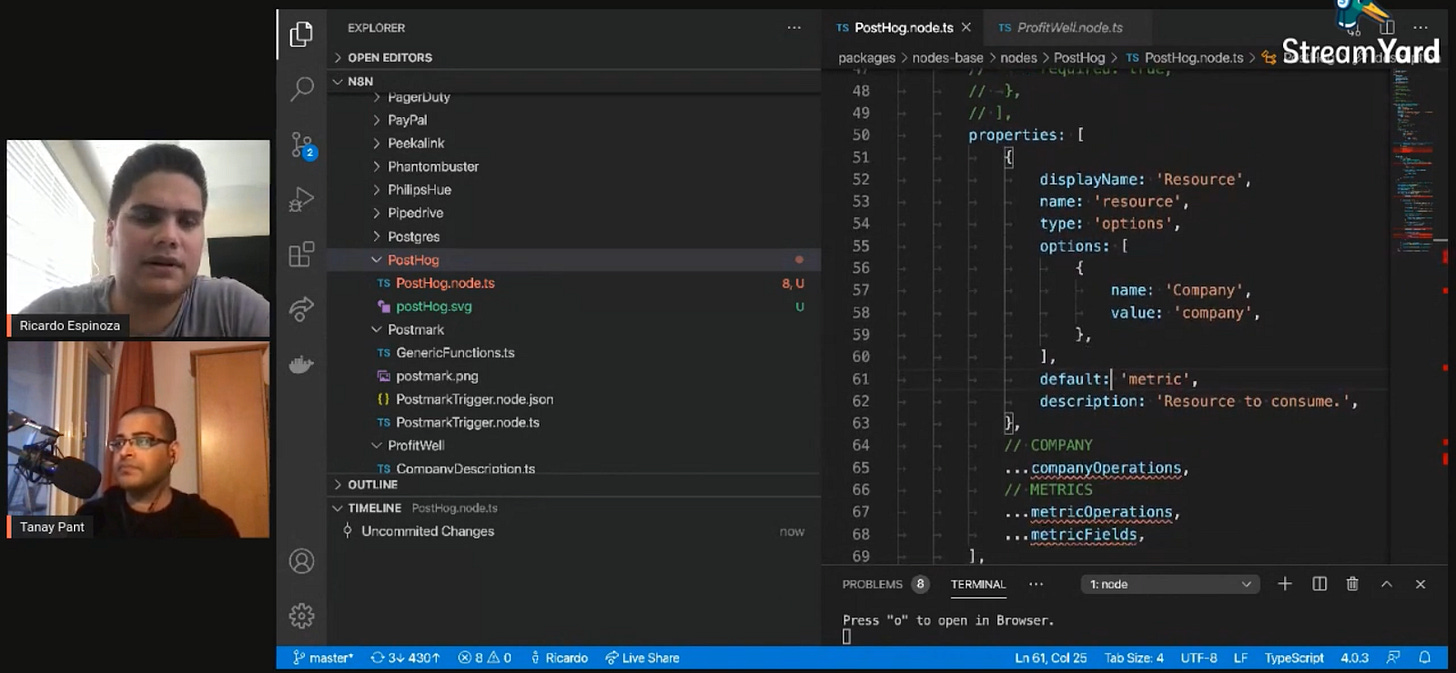How n8n builds an amazing product together with their community
An interview with Tanay Pant, Head of Developer Relations at n8n
Hey community friends! 👋 It’s been a while but we have a new interview for you. We chatted with Tanay Pant a while ago. Tanay is Head of Developer Relations at n8n.
Tanay shares how responsiveness goes a long way in turning users into fans, how they think ‘value first’, how they decided on Discourse over Slack, and how important transparency is. And these are just a few random highlights of our chat.
There’s much more to discover 🕵️♂️ Let’s dive in, and don’t forget to hit the subscribe button (if you haven’t) to follow along on the next issues! 👇
Follow Build With Users on Twitter for quotes, golden insights & more 💙
About n8n and Tanay
n8n is a free and open workflow automation tool that makes it easy for anyone to design their workflow visually. It currently offers integrations for syncing data between 150+ apps, with the possibility of creating custom integrations. Launched on Product Hunt by its founder Jan Oberhauser, it managed to become the number 1 product of the week in October 2019. Since then, both the community and the team behind n8n have been growing at a rapid pace. Their GitHub repository already received over 12k stars and currently lists more than 125 contributors, underlining that n8n is truly built together with users.
Tanay Pant is the Head of Developer Relations at n8n. As a book author, podcast host, conference speaker, developer, and tech enthusiast, he knows a lot about how to engage with a tech-oriented community. Being listed as a contributor to the Firefox web browser by the Mozilla Foundation means that he is no stranger to making contributions to software either.
When did n8n start working on community building, and why?
Community building began right at the start of n8n when our founder put the project up on GitHub, intending to create a kind of collaborative aura around it. Besides getting people excited, putting effort into the community gives us valuable insights. It's in our best interest to make things easier for the community, because who better than our users to tell us what needs to be improved? We also wanted to create a space where people can talk about automation, share ideas, and inspire each other.
How much effort do you put into community building at this point? Is it mostly you working on it?
For the most part, community building is essentially a function of DevRel – but in our case, it's a holistic effort. If you look at even a subsection of our community, such as the forum, you'll find that members of the DevRel team are very engaged. But so is our founder and CEO, as well as members of our engineering team. This collective approach helps a lot in community building.
It also helps in how we respond to requests by community members. When people request new things in the community and others upvote them, we try to act fast.
The community member was so impressed and happy that he posted about it everywhere.
Somebody commented on one of our releases back in December, mentioning they would like an integration for a particular service. We call these 'nodes.' It's the core of n8n, as these nodes allow creating your workflow with all sorts of third-party tools. In response, our team member Ricardo managed to cater for it within a day. The community member was so impressed and happy that he posted about it everywhere.
This is an excellent way for us to turn users into fans. It's always our ultimate goal for community members to turn into advocates. But to make that happen, we need to take a step beyond community building. We must assess if it is only about the community giving us reach or if we are providing value. And a big part of what we do in terms of delivering value comes down to taking their requests, making sure things are prioritized correctly, answering questions within a reasonable time-frame, and helping them with different education-adjacent topics like video tutorials, docs, and so on.
Do you have any formalized programs to turn people into advocates?
We only started proper advocacy from mid-April last year, building on this framework of awareness, enablement, and adoption. I have seen DevRel teams zero in on outreach and focus on speaking at conferences, which can be great to get the word out about the product and attract people. People who discover about the community that way, then come back to find elements missing on the enablement side of things. There is a lack of resources and proper documentation, which makes them drop out of the community. I think that's a tough challenge to have. It's way harder to get someone back who has already dropped out than to have someone stick around from the start.
It's way harder to get someone back who has already dropped out than to have someone stick around from the start.
Therefore, over the past year, we have been focusing a lot on enablement: on bringing our documentation to a state stable enough to answer questions. We have also been working on our Medium publication. In the last ninety days, we have had more than twenty-three thousand minutes read. It's great to see communities utilizing these resources. Now that these frameworks are in place and there's a foundation for people to educate themselves, we're going to start focusing more on awareness.
So the focus so far has been mostly on education and adoption as opposed to more awareness-related programs?
Exactly. Unless it's a big team, I think awareness should be carefully balanced with education or enablement. Because the moment the community starts seeing you as a salesperson who has an ulterior motive behind helping, it changes the interactions and the value that comes out of it.
Before we produce something on Twitter, we always think, "are followers going to gain value from this?" otherwise, we don't post it.
Social media is a good example. A lot of people/brands spend a lot of time on social media. And that makes sense depending on what stage they are in and what their purpose is. Being a small team, we run a Twitter account - but we don't put effort into following other accounts. We thought about that once since several other brands do it. Then we defaulted to the question, "What value does that bring to the community?" And we didn't have an answer for that. So we decided against it. Before we produce something on Twitter, we always think, "are followers going to gain value from this?" otherwise, we don't post it. I don't think we have ever posted something like, "Hey, sign up to n8n cloud!". We don't do that kind of traditional marketing. At least not at this stage.
One way you make people more engaged and turn them into advocates is by listening to their requests and acting upon them rather quickly. Do you have other examples along these lines?
Building based upon requests is something we do only when the same thing gets upvoted frequently. Other than that, we talk to the community members about what they are doing. We share many stories on how we are using n8n, which is a good way for people to learn the different facets of the product.
Something else we do is interviewing community members on their approach to how they're using n8n. Since there are so many different ways to use our tool, the stories are very inspiring. And that helps with engaging community members as well.
Can you give us an overview of the community initiatives and the tools you use?
We haven't had a lot of very specific community initiatives. We'll be focussing more on this at the start of this quarter. One of the things we did was participate in MLH (Major League Hacking) - a program for students striving to get into the engineering world and lock internships with companies who have source code on GitHub, so they can build up a profile there. That was a great experience.
You're using Discourse as a space for your community. Do you have other channels as well?
It's mainly the Discourse forum for now. I believe communication platforms like Slack can be interesting to use as a community tool, but we chose Discourse because Slack lacks a lot in moderation. It's essential to take care of the community team, so they don't get bombarded with messages and requests.
Having a forum makes it easier since members can find answers through questions that were already answered. A lot of questions tend to be recurring. There are new things as well, but more often than not, we can reference one of the threads to address someone's doubt, question, or anything else. That's why we stick to Discourse for now.
We haven't heavily customized it either. We have added a few things for the moderation purpose, but other than that, it's pretty much as is. We have been looking at using Discourse in slightly different ways compared to how most companies use it for their community. Recently, for example, we added a show-and-tell category where people can display the projects that they have been building with n8n.
That helps diversify the Discourse beyond just Q&A, and it's rewarding when community members we have been interacting with for a while start answering questions from other members. In the future, that could be a great metric for measuring success.
Is there anything else you have tried to do to keep people engaged? Do you have ways to stimulate responses? Any gamification?
We're planning to work on that soon. But I think it's essential to do that wisely. I've been part of a couple of communities, and I think people often overuse these. Sometimes you would end up getting ten notifications per day from a community, and if that's the case, I'm going to unsubscribe. People already have full inboxes. Still, we've been thinking about different ways to do that.
We have already started implementing a system via our newsletter and Twitter that helps us feature that month's contributions, acknowledge community members who have created something incredibly cool, or have spent time answering other people's questions. That helps acknowledge our members and give them credit for what they've done.
You also have the product's source publicly available on GitHub where members of the community can contribute. How is that working for you?
n8n is on Github as a fair-code model. One of our focuses has been to build guides that enable people to create their own 'nodes', so we speed up the process of letting people design their workflows with whatever integration possible.
Although this is always open to people, we barely actively touched this part of advocacy last year. We wanted to fix the "blank canvas problem" in our product first, which is essentially somebody coming into our tool and wondering where to go from there or what to automate first.
As this is somewhat resolved, we are now focussing more on making contributions easier. The node contribution guide (we call different integrations "nodes"), for instance, isn't very easy. At least not for somebody relatively new in this area. We're now focussing on making that part more accessible, and that's going to involve different assets, starting with documentation. Once that is set, we can build on top of it with live streams, workshops, and articles.
We currently have a contribution guide that outlines some of the basics, but it is somewhat disconnected. I think introducing a more organized version would be helpful there.
You're about to improve the parts around contribution guidelines to make it easier for people to contribute. Have you been doing anything to stimulate a contributive behavior so far or does it happen organically?
A lot of people are contributing organically. We did a few things, but nothing major. We touched up the contribution guidelines because there had been common issues in the contributions, which affected the time it took to review them. I think that's a crucial aspect when handling community contributions.
Thinking back to my first-ever contribution to a project on GitHub, someone commented on the pull request I sent within an hour. I made the change, and it got merged within half a day. I remember thinking, "wow, I contributed something that now exists on their website." Yet if they had taken a month to reply and another to merge, I would have dropped out, which would have been bad for both parties.
I believe that how you handle contributions impacts the community and the product; it touches each contributor. That's why we've been improving the guidelines on GitHub itself. Things like making sure a PNG icon is compressed to 60x60, so community members don't need to make too many changes. Getting too many comments on your first contribution can be intimidating, so we want to avoid that by making improvements to the guidelines. People can then take it into account right away. That said, sometimes, if the changes are too extensive or too small to communicate back to someone, we take it in, make the changes ourselves and merge it in.
I imagine the core of the product needs improving sometimes. What does the process of getting such insights from the community and feeding that into the product look like?
We are currently a team of two working on the DevRel side of things. One of our team members is focused on the community forum, answering questions. When I was doing a bit of that in December, I realized there were trends in questions – I would often answer the same thing three times. If that's a matter of the core product requiring a significant change, we need to document those cases to evaluate and eventually improve on it. We mostly use JIRA or Notion for that. If it's the case of a small fix that can improve things by huge dimensions, we try to escalate these requests quickly. Either way, it gets communicated into the backlog.
The team is also involved in doing user onboarding sessions, which also gets us some valuable insights. We are tapping into different areas: into the community, into conversations with people building with n8n, and integrations from other companies. Tapping into these diverse ecosystems helps us capture a lot of the sentiment, the things people would like to see from us. That informs the product backlog, as well as what we need to add or improve in terms of content or documentation.
Do you have any advice for people who want to start an early community around their startup?
I'd say it's essential to be transparent with the community about what your aim is as a company; to share your vision with them. By nature, volunteering is something you do in your free time, and volunteering in a community requires effort from contributors. I think it's super important to let them know about the direction you're taking and the things you value.
it's important to keep the internal mission and values coherent with what we showcase externally.
I've been a part of many different communities, and I appreciate having transparency over what's going on, so I'm sure other community members also appreciate that. Plus, it avoids potential disappointments in the future when people end up having a completely different opinion compared to what you're planning for the community. I think it's important to keep the internal mission and values coherent with what we showcase externally.
Another thing is that a lot of people get DevRel experience at middle-stage or larger-stage companies. Often these experiences don't translate one-on-one to smaller companies. That's essential to consider when anyone is transitioning into a DevRel tool for a smaller company. You have to be careful about how you approach problems since your experience might not always be relevant. It's vital in terms of communicating community values, how fast you should build out the team, and a lot of other things.
How do you get inspiration for your work?
For developer relations, I like the newsletter called Developer Avocados. And then there's DevRel Weekly by Mary Thengvall, which is great. I'm working on a podcast myself as well, called Technically True. In this second season of it, we're going to talk a lot about communities. We're planning on interviewing founders and people looking to build communities around their product. But also people going into companies without any DevRel structures to see how they can go about doing that.
Where can people find out more about you and n8n?
You can find me on Twitter. Also, have a look at our website or check out our community if you're interested.
Follow Build With Users on Twitter for quotes, golden insights & more 💙
Thanks for reading this issue 🙏
Next week we plan to have another cool newsletter for you 💪, stay tuned, and subscribe if you didn’t yet.
✌️ Cheers,






